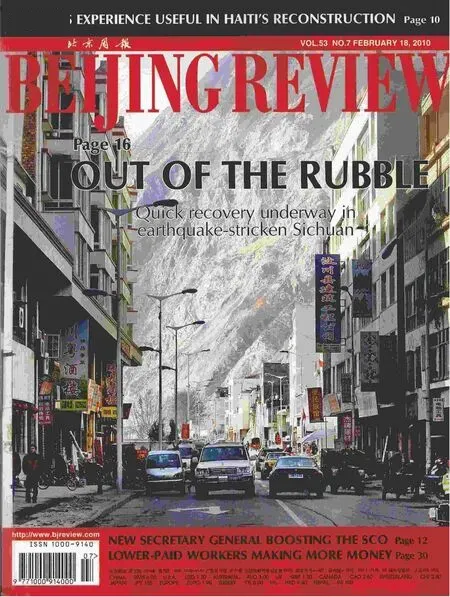Strong Support for Exporters
Strong Support for Exporters
The sweeping international financial crisis has taken its toll on the Chinese economy, especially in the export sector. On the one hand, overseas demand has plummeted, while on the other, with the worsening credit environment and emerging trade protectionism, export enterprises are suffering from rising credit risks to the point where some dare not even accept orders.
These factors have created uncertainty for China’s export enterprises. Export credit insurance, as a major means to promote international trade in accordance with WTO policies, will surely play an increasingly important role in stabilizing exports, promoting growth and guaranteeing employment in China.
When delivering his government work report at the Second Session of the 11th National People’s Congress last March, Premier Wen Jiabao said endeavors should be made to maintain the steady growth of foreign trade. China is focused on expanding domestic demand, but efforts to strengthen exports should not be relaxed. Considering the dramatic decrease in foreign demand and the rise of international trade protectionism, we should give greater support to work involving exports and imports, clarify and adjust foreign trade policies and improve trade conditions, Wen said. We must stick to a strategy of diversification of export markets and increase market shares by providing quality products, consolidating traditional export markets and vigorously expanding emerging markets. The funds available for foreign trade development should be increased and major efforts should be made to support small and medium-sized enterprises to expand into international markets and create export brands.
Preferential policies and tax breaks will mainly go to labor-intensive and hi-tech industries to protect their world market share.
Smaller companies will get more fnancing guarantees from financial institutions, as the government promised to allocate an unspecifed amount of funds from the central budget.
Shrinking external demand leading to declining exports has remained “the biggest diffculty” facing the Chinese economy since the outbreak of the fnancial crisis, as China’s exports take an overwhelming share in its economic performance.
At the end of May 2009, the Chinese Government formulated a series of measures to improve export credit insurance regulations. The measures included enhancing export credit insurance application coverage, arranging $84 billion for export credit insurance and reducing premium written rates.
Improving export credit insurance is recognized as a better measure to improve export advantages in the long term.
China Export and Credit Insurance Corp., known as Sinosure, is currently the only policy-oriented insurance company specializing in the export business, which protects exporters from the risk of payment failure of clients. It started operating on December 18, 2001. Headquartered in Beijing with four operational departments, Sinosure has built a service network of 14 branches and eight business offices nationwide, as well as a business offce in London. Sinosure offers coverage against political and commercial risks. Political risks include restrictions on the transfer and remittance of foreign exchange, expropriation, nationalization and war. Commercial risks include credit risks on the part of buyers (default, bankruptcy and rejection of goods) and credit risks on the part of buyers’ banks (e.g. the issuing bank or confrming bank in the case of L/Cs).
The company underwrote $37 billion in short-term export credit insurance in 2008, up 30 percent year on year. Such coverage lasts for up to a year after the placement of an order.
Ever since China’s policy on completing export credit insurance was released in May 2009, Sinosure has been committed to fulflling this goal.
On June 3, 2009, Sinosure and the Ministry of Commerce held the National Meeting on the Export Credit Insurance Work. Sinosure President Wang Yi said the national interest was the highest priority and Sinosure would make every effort to fulfill its mission concerning the country’s interest and make contributions to stabilizing exports, promoting growth and guaranteeing employment.
By December 18, 2009, Sinosure had provided $110.03 billion worth of insurance and guarantee business, including $86.23 billion of short-term export credit insurance business.
The short-term export credit insurance surged 121.5 percent over the previous year. Such business covered 17.9 percent of China’s exports by the end of November, 2.8 times that in 2008.
Sinosure believes target market diversifcation is a viable way for export enterprises to solve any predicament and has enhanced its support for export credit insurance in emerging markets accordingly. When the international photovoltaic industry turned from a suppliers’ market to a buyers’ market, the buyers required more favorable payment terms, such as payment settlements in 90-180 days. Sinosure made adjustments accordingly, and from January to June 2009, Sinosure insured $800 million for China’s photovoltaic industry, almost four times the amount of 2008.
For larger orders, Sinosure extends its credit duration. In 2009, contracts with a duration of more than 90 days increased 174.8 percent year on year. Sinosure believes that providing longer contracts will help export enterprises increase competitiveness and stabilize their market share.
Key industries, or advantageous industries, play an important role in China’s exports. Supporting their exports has always been at the top of Sinosure’s agenda.
In 2009, Sinosure’s short-term insurance for electromechanical products totaled $41.3 billion, an increase of 143.1 percent year on year; high-tech products $17.3 billion, an increase of 269.5 percent year on year; and textile products $12.3 billion, up 166.7 percent.
Sinosure has achieved a major increase in its export credit insurance against the background of plummeting exports and external export risks.

